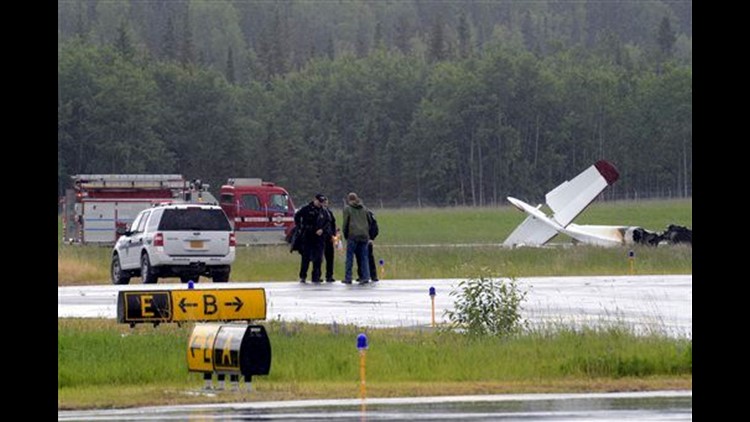ANCHORAGE, Alaska (AP) — The Antonakos family of Greenville, S.C., usually stuck close to home for summer vacations, but this year they decided to explore Alaska.
"They were very excited," the father of Kimberly Antonakos, H. Wayne Clayton, said Monday. "They never had been there before and wanted to see what it was like."
Kimberly Antonakos, her husband Melet Antonakos and their three children were among those killed in a fiery Alaska plane crash that left all 10 on board dead.
The Antonakos family of Greenville, S.C., usually went to Myrtle Beach, S.C., each summer, but Clayton said Monday his daughter and her family decided to travel to Alaska for 10 days this year instead.
Clayton said his son-in-law sold computer software to hospitals and doctors' offices, while Kimberly shuffled the three children to their many activities. The children were 16-year-old Olivia, 14-year-old Mills and 11-year-old Anastacia.
"It's rough, to lose five (family) members at one time," Clayton said.
Investigators have begun their probe of the de Havilland DHC3 Otter that crashed and burned Sunday at the airport in Soldotna, about 75 miles southwest of Anchorage on the Kenai Peninsula. The plane had just taken off and apparently was en route to a fishing lodge, according to National Transportation Safety Board investigator Clint Johnson.
South Carolina House Majority Leader Bruce Bannister said four of the other victims were also a family from Greenville, S.C. - Chris McManus and Stacey McManus and their two children.
Bannister said the Antonakos family lived on his street in Greenville. Olivia was going to be in 11th grade, Mills was going to be in ninth grade and Anna was going to be in sixth grade next year, he said.
"They were great kids — just a fantastic family," Bannister said.
The victims also included the plane's pilot.
The Federal Aviation Administration said the Otter was operated by Rediske Air, based in Nikiski, another Kenai Peninsula community. The pilot of the downed plane was Nikiski-based Walter "Willie" Rediske, company spokesman Andy Harcombe said.
The remains of the victims were sent to the State Medical Examiner's Office in Anchorage for autopsies and positive identifications.
The majority of Alaska communities aren't connected to the road system, with small planes providing a vital link to the outside world. They bring in food, medicine, mail and other supplies, and provide for air travel — with scheduled and on-demand flights. Air taxis, which provide nonscheduled commercial flights, provide access to wilderness areas and link small, remote villages, according to a National Transportation Safety Board report.
During the summer tourist season, helicopters and seaplanes — small aircraft outfitted with floats that take off from and land on water — are commonly seen in places like Juneau, Alaska's capital city, taking visitors to see glaciers, bears or other attractions.
"Aviation is a basic mode of transportation and the small general aviation aircraft is the equivalent of the minivan for a family in Bush Alaska," C. Joy Journeay, executive director of the Alaska Air Carriers Association, said in an email.
"Over 10,000 piston engine aircraft are registered in the State of Alaska and provide the primary means of transportation," she said. "They are the backbone of transportation for the state."
The NTSB sent an investigative team from Washington, D.C., that arrived in Anchorage on Monday afternoon before heading to Soldotna. NTSB member Earl Weener said the on-scene investigation is expected to last between five and eight days, with a probable cause determination expected in about a year.
At the time of the crash, there were light winds and high clouds, Johnson said.
Rediske Air was involved in an accident last year in Nikiski, according to an NTSB database report.
In the non-injury mishap, the pilot of a Cessna 207A plane misidentified the runway surface at night and landed the aircraft in a snow bank. The pilot said most of the runway lights had been covered by heavy snow and were not clearly visible.
The plane's wings and horizontal stabilizer sustained substantial damage.
In the Soldotna crash, the flames took 10 minutes to extinguish and initially kept firefighters from reaching the wreckage, according to authorities.
The de Havilland is similar to an Otter that crashed in Alaska in 2010, killing former U.S. Sen. Ted Stevens and four others, Johnson said. The plane in the Stevens crash was equipped with floats, while the plane in Sunday's crash had wheels.
It's possible to drive from Anchorage to Soldotna, but it's about a four-hour trip as the highway hugs Turnagain Arm, then cuts through a mountain pass.
Soldotna, with a population of about 4,300, is on the banks of the Kenai River, and the area is busy this time of the year with people fishing for salmon. The airport is located about a mile from a commercial area and has a paved runway that is 5,000 feet long.
___
Associated Press writers Becky Bohrer in Juneau, Jeffrey Collins in Columbia, S.C., and Shannon Dininny in Yakima, Wash., contributed to this report.
___
Follow Rachel D'Oro at https://twitter.com/rdoro
Copyright 2013 The Associated Press.



